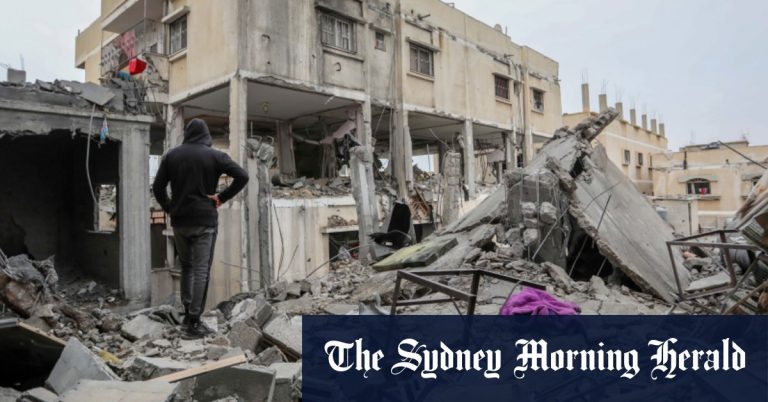Majid Al-Ansari, spokesman for the Qatari Foreign Ministry, said: “We do not have a final agreement on any of the issues that hinder reaching an agreement.” He added: “We are still hopeful that we can reach some kind of agreement.”
Two senior Hamas officials told Reuters that Biden's statements, which seemed to indicate that an agreement had already been reached in principle, were premature.

Palestinians evacuated from a building bombed by Israeli occupation aircraft in Rafah, Gaza.credit: Getty Images
“There are still big gaps to be filled,” one Hamas official said. He added, “The basic and main issues related to the ceasefire and the withdrawal of Israeli forces are not clearly mentioned, which delays reaching an agreement.”
Israel did not comment directly on Biden’s statements, but government spokesman Tal Heinrich said that any agreement would require Hamas to abandon “strange demands, in another orbit, on another planet.”
“We are ready. But the question remains whether Hamas is ready or not.”
The Israeli news website Ynet quoted senior Israeli officials, whose identities were not revealed, as saying that they do not understand “on what basis (Biden’s) optimism is based.”
“Schindler's List 2024”
Hamas fighters killed 1,200 people and took 253 hostage on October 7, according to Israeli statistics, leading to Israel's ground assault on Gaza. Health authorities in the enclave say nearly 30,000 people have been confirmed dead.
Hamas has long insisted that it will only release all its hostages as part of a deal that ends the war forever. Israel said that it would consider only a temporary halt to the war, and would not end the war until it eliminated the extremist Islamic group.
According to the senior source close to the talks, the draft proposal on the table is for a 40-day truce during which Hamas would release about 40 hostages – including women, those under 19 or over 50, and the sick – in return. For about 400 Palestinian prisoners, at a rate of 10 for each one.

A camp in Rafah shelters Palestinians who were displaced due to the Israeli attack on the Gaza Strip.credit: AP
Israel will reposition its forces outside populated areas. Gazans, except for men of fighting age, will be allowed to return to their homes in previously evacuated areas, and aid will be increased, including urgent housing supplies.
In Rafah, where more than half of Gaza's 2.3 million people now live on the southern end of the Gaza Strip, Rehab Radwan expressed her despair at the prospect of a temporary truce that would only lead to renewed fighting. The only ceasefire in the war so far collapsed in November after just one week.
He added: “We hope there will be a permanent ceasefire.” “We do not want to return to war because after the first truce, the war destroyed us and our homes,” said Radwan, who fled her home in Khan Yunis and now lives in a tent on the side of the road.
download
“Can you imagine – there is no food, nothing to drink. There are no basics of life.”
There may also be concern in Israel about a deal that fails to bring all the hostages home. Fighting-age Israeli males now make up the majority of those detained since Hamas released more than 100 women, children and foreigners during a brief truce in November.
Shelly Shem-Tov, whose son Omar, 21, was captured during a music festival stormed by gunmen on October 7, said negotiators must insist on the release of everyone.
“This is an inhumane situation. I keep saying it's the Schindler's List of 2024,” she told Israel's Channel 13, comparing the negotiations to a movie about a factory owner who makes a list of Jews to save them from the Holocaust.
“Who gets on the list? She's really counting them one by one, checking how many women are there, who knows how many wounded there are – and what are the chances of my son getting in?”
Reuters
Get a direct note from our foreigners Reporters About what's making headlines around the world. Subscribe to the weekly What in the World newsletter here.

